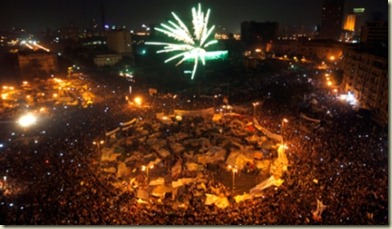He has finally gone. Thirty years of rule characterised by brutal secret police, rigged elections and rampant corruption have come crashing down in eighteen days of demonstrations. President Hosni Mubarak is no more.
 Tonight the Egyptian people are celebrating like they’ve never known- not just in Cairo, Luxor and Alexandria, but across the world. Reports are coming in of street parties in exile communities from New York, to Paris to London. Euphoria in its purest form has broken out. And so it should – for like the Germans, Polish, East Timorese, South Africans and others did before, the Egyptians are now experiencing the end of a dictatorship that tyrannised them for generations.
Tonight the Egyptian people are celebrating like they’ve never known- not just in Cairo, Luxor and Alexandria, but across the world. Reports are coming in of street parties in exile communities from New York, to Paris to London. Euphoria in its purest form has broken out. And so it should – for like the Germans, Polish, East Timorese, South Africans and others did before, the Egyptians are now experiencing the end of a dictatorship that tyrannised them for generations.
The struggle of course, is far from over. Mubarak might be history but democracy is by no means certain. Power is now in the hands of the armed forces – who gave the flailing president his final push. Whether, when and how they will ensure democratic transition are matters of pure speculation. The Generals have promised to lift the state of emergency that denied citizens their political freedoms throughout Mubarak’s rule – but words mean nothing without actions to follow. And historically, armed forces who hold power have been hugely reluctant to hand them over; the precedent is not good. Worries about Islamist groups and the challenge of fostering a democratic system in a state which has only known dictatorship create further negative undercurrents to the jubilation.
But at the same time, there are many reasons to be optimistic. The military top brass may have supported Mubarak, but huge swathes of the rank-and-file soldiers have been quick to side with the protestors. These are genuine patriots who signed up out of love for a country- not a man – and have long harboured a hatred of his favoured secret police force. Should the Generals try to cling to power therefore, they will first face the task of winning over their own men.
protestors. These are genuine patriots who signed up out of love for a country- not a man – and have long harboured a hatred of his favoured secret police force. Should the Generals try to cling to power therefore, they will first face the task of winning over their own men.
Secondly, the widely touted ‘Islamist threat’ that prompted the US to bankroll Mubarak for decades and is sending political tremors through Israel tonight – is by no means as significant as many believe it to be. The Muslim Brotherhood has long been the largest and most organised opposition group, but has nowhere near a majority support base. Furthermore, its’ leaders stated commitment to democracy (which though like the military’s promise cannot be blindly accepted) presents a promising starting point. Scenes of ordinary Muslims defending Coptic churches from attacks over Christmas, Coptic Christians defending Muslim protesters as they prayed in Tahrir Square and an absence of any real radical Islamist element to the demonstrations, all give additional strength the likelihood that Egyptian tolerance and religious pluralism will prevent any transformation to an Islamic Republic.
Beyond this, the sheer diversity of political viewpoints in Egypt is a positive sign for democracy. Despite Mubarak tirelessly imposing measures to destroy civil society- a plethora of loose Muslim, Christian, socialist and intellectual groupings do exist. And though such an eclectic patchwork with no clear popular leader will inevitably lead to widespread dispute, bartering and deal-making, this could provide a far more promising foundation for a democratic system than dominance by a single individual or interest.
More importantly than all of these factors however; we can afford to be optimistic because this has been the people’s revolution. It may have taken the army’s withdrawal of support to finally pull the rug from under Mubarak – but the change came from below: it was the millions who turned out to demonstrate day after day after day who truly brought him down. They were not deterred when Mubarak’s police beat them back. They did not surrender when his thugs attacked. And they did not accept his superficial compromises. Tonight they are calling for democracy – and any general, Islamist or aspiring dictator who wants to take them on will have a huge challenge ahead.




No comments:
Post a Comment